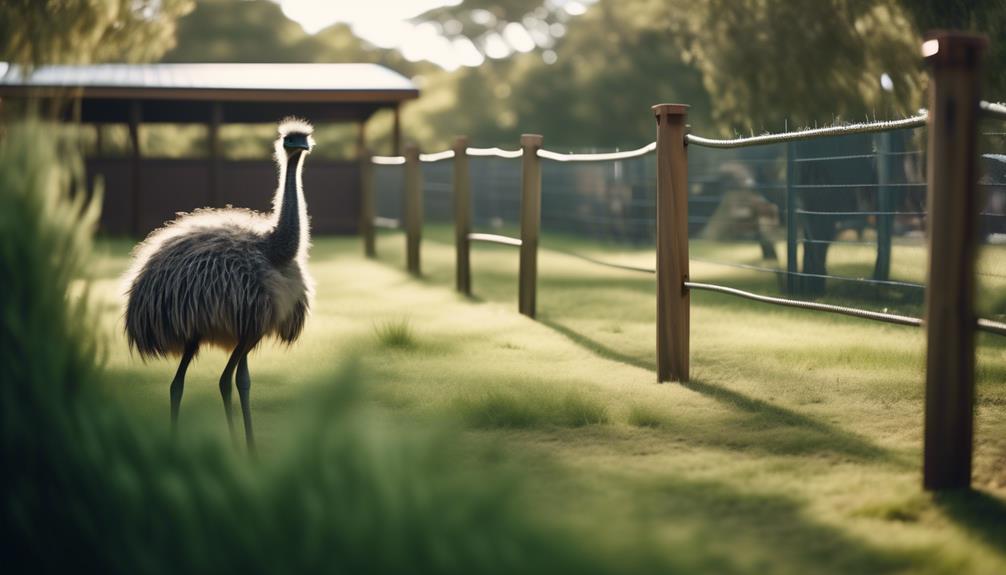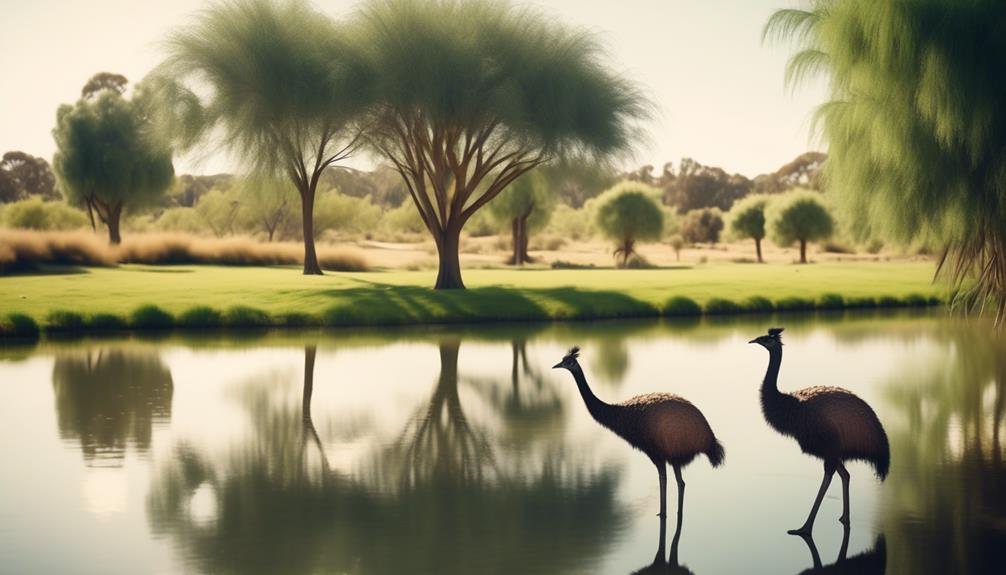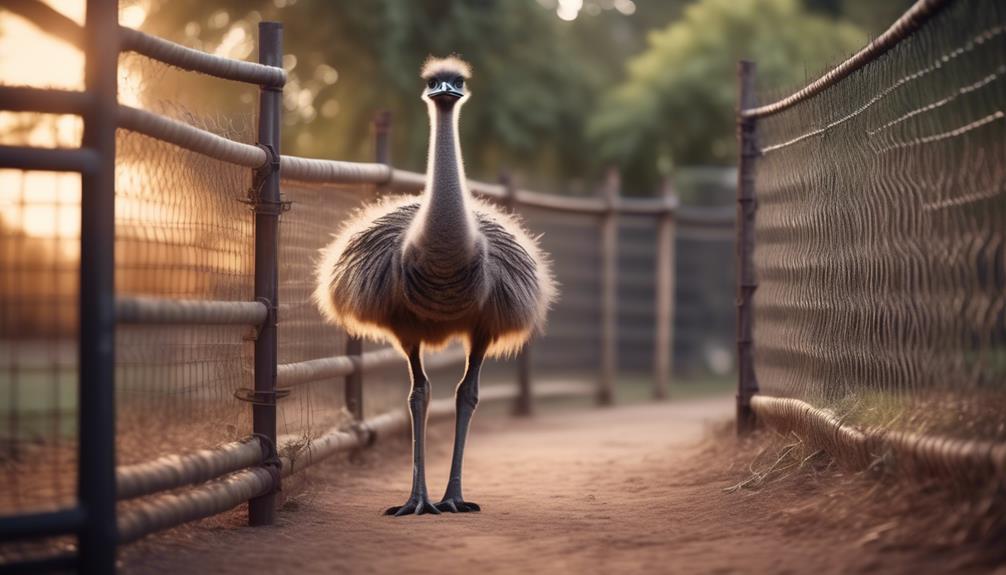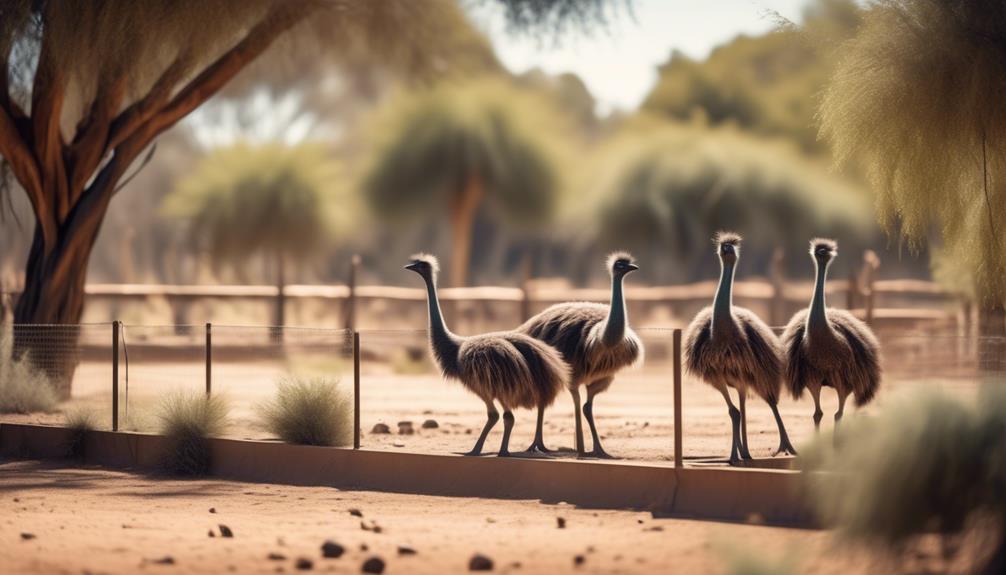
Imagine your emus soaring through the skies like majestic birds, their feathers gliding gracefully in the breeze.
Now, picture providing them with a home that not only keeps them safe and secure but also ensures their utmost comfort. But how exactly do you go about creating such a haven for your emus?
In this discussion, we will guide you through the essential steps of building a safe and comfortable home for these fascinating creatures. We will cover everything from location selection to designing their enclosure, fencing, shelter, and feeding system.
So, get ready to embark on a journey that will transform your emus' habitat into a sanctuary they can truly call their own.
Choosing the Right Location

When selecting the ideal location for your emu enclosure, it's essential to consider various factors to ensure the well-being and safety of these unique birds. One of the most important factors to consider is choosing the right climate for your emus.
Emus are native to Australia, where they thrive in hot and dry conditions. Therefore, it's crucial to recreate a similar climate in their enclosure. Emus are highly adaptable birds and can tolerate a range of temperatures, but they prefer a warm climate with plenty of sunshine.
In addition to the climate, finding the right flooring for your emu enclosure is vital. Emus have strong, powerful legs that enable them to run at high speeds. Therefore, the flooring needs to be sturdy and provide good traction to prevent injury.
Concrete or compacted soil are excellent options for flooring as they're durable and easy to clean. It's important to avoid using materials like gravel or sand as they can cause discomfort and foot problems for the emus.
Designing a Spacious Enclosure
To ensure the comfort and well-being of your emus, it's crucial to create a spacious enclosure that allows them to move freely and exhibit their natural behaviors.
Emus are large, flightless birds that require ample space to roam and stretch their legs. When designing their enclosure, prioritize maximizing natural light to create a bright and stimulating environment.
Emus thrive in open spaces, so it's essential to provide them with a large outdoor area where they can graze and explore. Incorporating enrichment activities will also keep your emus mentally and physically stimulated. Consider adding features like logs, boulders, and shallow pools for them to interact with. These elements will mimic their natural habitat and encourage natural behaviors such as foraging and bathing.
Additionally, emus love to dust bathe, so providing them with a designated dust bathing area is essential. Remember to regularly assess and adjust your enclosure to meet the changing needs of your emus.
Ensuring Proper Fencing and Security

Proper fencing and security are essential components when building a home for emus. Emus are social birds that require a safe and secure environment to thrive. Understanding their behavior and socialization patterns is crucial in designing a predator-proof enclosure.
When it comes to fencing, it is important to choose materials that are sturdy and tall enough to prevent emus from escaping. Emus are large and powerful birds that can jump up to 6 feet high, so a fence height of at least 7 feet is recommended. Additionally, the fence should be buried at least 1 foot underground to prevent emus from digging underneath and escaping.
To further enhance security, consider incorporating predator-proofing techniques into your emu enclosure. This can include adding an electric wire or a predator apron along the base of the fence to deter predators from digging under. Installing motion sensor lights and security cameras can also help monitor the area and deter potential intruders.
Here is a table summarizing some predator-proofing techniques for your emu enclosure:
| Technique | Description |
|---|---|
| Electric Wire | A shock wire placed on top of the fence to deter predators |
| Predator Apron | A mesh wire or steel apron buried along the base of the fence to prevent digging |
| Motion Sensor Lights | Lights that turn on when motion is detected, providing visibility and discouraging predators |
| Security Cameras | Cameras that can be monitored remotely to ensure the safety and security of the emu enclosure |
Providing Shelter and Nesting Areas
For optimal care and comfort, it's crucial to provide emus with suitable shelter and nesting areas in their enclosure. Emus are social birds that live in groups, so it's important to provide them with enough space and resources to accommodate their natural behavior and socialization needs.
When it comes to shelter, emus require a sturdy and secure structure that protects them from extreme weather conditions such as rain, wind, and intense heat. A well-constructed shelter should have solid walls and a durable roof to provide adequate protection. It should also be spacious enough to allow the emus to move around comfortably.
In addition to shelter, providing nesting areas is essential for emus to engage in their natural behaviors. Emus typically lay their eggs in a shallow nest on the ground. You can create nesting areas by clearing a flat area in the enclosure and lining it with soft materials such as straw or hay. This will provide a comfortable and safe space for emus to lay their eggs.
Creating a Suitable Feeding and Watering System

Creating an effective feeding and watering system is crucial for ensuring the health and well-being of your emus. When it comes to the emu diet, it's important to provide a balanced and nutritious meal for your birds. Emus are omnivores, so their diet should consist of a variety of food sources. Offer them a mix of fruits, vegetables, grains, and protein-rich foods like insects or small animals. It's also recommended to consult with a veterinarian or an expert on emu nutrition to ensure you're meeting all their dietary needs.
For watering options, emus require access to fresh, clean water at all times. A suitable watering system could include a large trough or multiple water bowls placed strategically around their enclosure. It's important to regularly clean and refill the water containers to prevent contamination and ensure the water is always fresh.
To promote a healthy feeding and watering routine, establish a consistent schedule for providing meals and checking water levels. This will help your emus develop a routine and ensure they're receiving adequate nutrition and hydration. Regularly monitor their eating and drinking habits to ensure they're consuming enough food and water.
Frequently Asked Questions
How Do I Train My Emus to Be Comfortable With Human Interaction?
To train your emus and make them comfortable with human interaction, use positive reinforcement and socializing methods. Start by gradually introducing yourself, offering treats, and spending time with them regularly. Patience and consistency are key to building trust and a strong bond.
What Should I Do if My Emus Become Aggressive Towards Each Other?
If your emus become aggressive towards each other, it's crucial to manage their aggression to prevent fights. Create separate areas for them to establish territories, provide plenty of food and water, and monitor their behavior closely.
Are There Any Specific Regulations or Permits Required for Keeping Emus as Pets?
To keep emus as pets, specific regulations and permits may be required. It's important to check with your local authorities to ensure you're in compliance. They can provide detailed information on what is needed for keeping emus legally.
How Often Should I Clean the Emu Enclosure to Maintain Hygiene?
To maintain hygiene in your emu enclosure, it's important to clean regularly. Emus are messy creatures, and their waste can accumulate quickly. Cleaning at least once a week will help keep their home safe and comfortable.
Can Emus Be Kept in Groups With Other Types of Birds or Animals, or Should They Be Housed Separately?
Group housing benefits emus as they are social animals, but challenges arise when housing them with other animals. Emus may become aggressive towards smaller birds or animals, leading to potential harm. Separate housing is recommended for their safety and well-being.
Conclusion
In conclusion, building a safe and comfortable home for your emus requires careful consideration of their needs and surroundings. From choosing the right location to providing adequate shelter and feeding systems, every aspect plays a crucial role in their well-being.
So, why settle for anything less when you can create a haven for your emus to thrive in? Start planning today and give your feathered friends the home they truly deserve.




